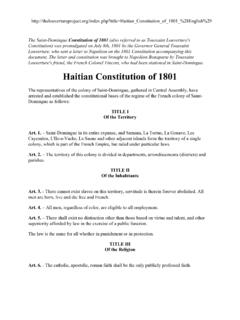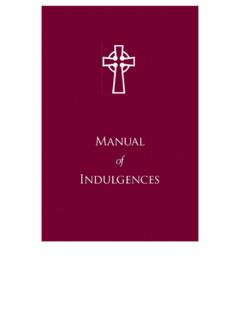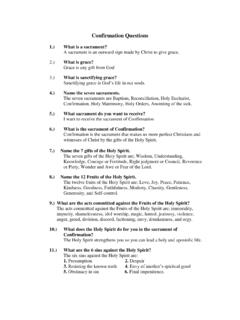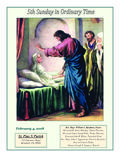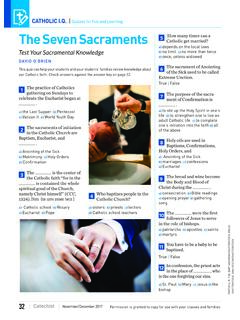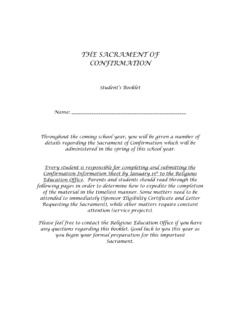Transcription of The History of Sexuality - Warwick
1 The History of Sexuality Volume I: An Introduction by Michel Foucault Translated from the French by Robert Hurley Pantheon Books New York English translation Copyright 1978 by Random House, Inc. All rights reserved under International and Pan-American Copy right Conventions. Published in the United States by Pantheon Books, a division of Random House, Inc., New York, and simul taneously in Canada by Random House of Canada Limited, Toronto. Originally published in France as La Volante de sa voir by Editions Gallimard, Paris.
2 Copyright 1976 by Editions Gallimard. Library of Congress Cataloging in Publication Foucault, Michel. The History of Sexuality . Translation of Histoire de la sexualite. CONTENTS: v. I. An introduction (translation of La Volonte de savoir) I. Sex customs-- History --Collected works. I. Title. 1978 '7 78-51804 ISBN 0-394-41775-5 Manufactured in the United States of America First American Edition Grateful acknowledgment is made to Doubleday & Com pany, Inc., for permission to reprint an excerpt from a poem by Gottfried August BUrger cited by Arthur Seho penhauer in The Metaphysics of the Love of the Sexes, from The Will to Live: Selected Writings of Arthur Scho pen hauer, edited by Richard Taylor.
3 PART TWO The Repressive Hypothesis I The Incitement to Discourse The seventeenth century, then, was the beginning of an age of repression emblematic of what we call the bourgeois soci eties, an age which perhaps we still have not completely left behind. Calling sex by its name thereafter became more diffi cult and more costly. As if in order to gain mastery over it in reality, it had first been necessary to subjugate it at the level of language, control its fr ee circulation in speech, ex punge it fr om the things that were said, and extinguish the words that rendered it too visibly present.
4 And even these prohibitions, it seems, were afraid to name it. Without even having to pronounce the word, modern prudishness was able to ensure that one did not speak of sex, merely through the interplay of prohibitions that referred back to one another: instances of muteness which, by dint of saying nothing, im posed silence. Censorship. Yet when one looks back over these last three centuries with their continual transformations, things appear in a very different light: around and apropos of sex, one sees a veritable discursive explosion.
5 We must be clear on this point, how ever. It is quite possible that there was an expurgation-and a very rigorous one-of the authorized vocabulary. It may indeed be true that a whole rhetoric of allusion and metaphor was codified. Without question, new rules of propriety 17 18 The History of Sexuality screened out some words: there was a policing of statements. A control over enunciations as well: where and when it was not possible to talk about such things became much more strictly defined; in which circumstances, among which speakers, and within which social relationships.
6 Areas were thus established, if not of utter silence, at least of tact and discretion: between parents and children, fo r instance, or teachers and pupils, or masters and domestic servants. This almost certainly constituted a whole restrictive economy, one that was incorporated into that politics of language and speech-spontaneous on the one hand, concerted on the other-which accompanied the social redistributions of the classical period. At the level of discourses and their domains, however, practically the opposite phenomenon occurred.
7 There was a steady proliferation of discourses concerned with sex-spe cific discourses, different fr om one another both by their fo rm and by their object: a discursive fe rment that gathered momentum fr om the eighteenth century onward. Here I am thinking not so much of the probable increase in "illicit" discourses, that is, discourses of infraction that crudely named sex by way of insult or mockery of the new code of decency; the tightening up of the rules of decorum likely did produce, as a countereffect, a valorization and intensification of indecent speech.
8 But more important was the multiplica tion of discourses concerning sex in the field of exercise of power itself: an institutional incitement to speak about it, and to do so more and more; a determination on the part of the agencies of power to hear it spoken about, and to cause it to speak through explicit articulation and endlessly ac cumulated detail. Consider the evolution of the Catholic pastoral and the sacrament of penance after the Council of Trent. Little by little, the nakedness of the questions fo rmulated by the con fe ssion manuals of the Middle Ages, and a good number of those still in use in the seventeenth century, was veiled.
9 One Th e Repressive Hypothesis 19 avoided entering into that degree of detail which some au thors, such as Sanchez or Tamburini, had for a long time believed indispensable for the confession to be complete: description of the respective positions of the partners, the postures assumed, gestures, places touched, caresses, the pre cise moment of pleasure-an entire painstaking review of the sexual act in its very unfolding. Discretion was advised, with increasing emphasis. The greatest reserve was counseled when dealing with sins against purity: "This matter is similar to pitch, for, however one might handle it, even to cast it far fr om oneself, it sticks nonetheless, and always soils.
10 "l And later, Alfonso de' Liguori prescribed starting-and possibly going no fu rther, especially when dealing with children with questions that were "roundabout and vague."2 But while the language may have been refined, the scope of the confession-the confession of the flesh-continually increased. This was partly because the Counter Reformation busied itself with stepping up the rhythm of the yearly con fession in the Catholic countries, and because it tried to impose meticulous rules of self-examination; but above all, because it attributed more and more importance in penance -and perhaps at the expense of some other sins-to all the insinuations of the flesh: thoughts, desires, voluptuous ima ginings, delectations, combined movements of the body and the soul.



